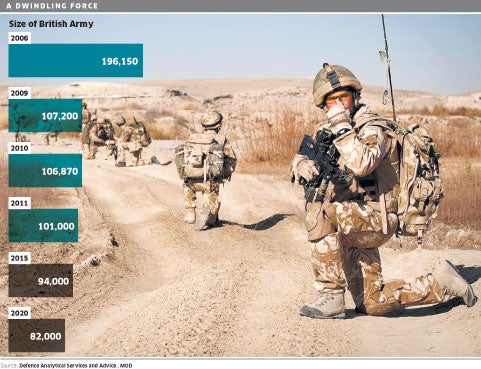Reservists to take frontline roles as 19,000 troops are cut by 2020

Your support helps us to tell the story
From reproductive rights to climate change to Big Tech, The Independent is on the ground when the story is developing. Whether it's investigating the financials of Elon Musk's pro-Trump PAC or producing our latest documentary, 'The A Word', which shines a light on the American women fighting for reproductive rights, we know how important it is to parse out the facts from the messaging.
At such a critical moment in US history, we need reporters on the ground. Your donation allows us to keep sending journalists to speak to both sides of the story.
The Independent is trusted by Americans across the entire political spectrum. And unlike many other quality news outlets, we choose not to lock Americans out of our reporting and analysis with paywalls. We believe quality journalism should be available to everyone, paid for by those who can afford it.
Your support makes all the difference.Thousands of regular soldiers will be replaced with part-time reservists as part of a shake-up of the military that will bring professional troop numbers to their lowest level since the Boer War. The Defence Secretary Liam Fox announced a £1.5bn investment in UK reserve forces over the next 10 years as they take over more frontline duties from professional soldiers, whose numbers will be reduced from around 101,000 to 82,000 by 2020.
The reduction of army personnel will come on top of the 7,000 already marked to be cut by 2015, as stipulated in last year's defence review. Dr Fox said the reforms were needed to "rebalance" the armed forces when operations in Afghanistan end.
"As we move out of Afghanistan and move to a more adaptive posture in our armed forces we can almost certainly get a rebalancing," he said. "Countries like Australia, Canada and the United States have a very different level of balance between regulars and reserves."
He added: "What I intend to do is see a build-up again of the reserves so that their utility is greater and also so that over time we create the sort of civil contingency in the UK that sadly we've been lacking."
Dr Fox also announced a commitment for a 1 per cent a year in real terms increase in the defence equipment and support budget from 2015-16 to 2020-21, enabling the Ministry of Defence to acquire 14 additional Chinook helicopters, upgrade the Warrior armoured vehicle and develop the Navy's planned new global combat ship.
The significant reduction in troop numbers is likely to mean the end of some infantry battalions. A number of barracks and RAF Leuchars in Scotland are expected to close.
In a statement to MPs, Dr Fox said the changes would bring the structure of the armed forces more into line with "comparable countries" such as the United States, Canada and Australia.
"This significant investment will also build up the capacity of the reserves to contribute to homeland security," he said.
The vice chief of the Defence Staff, General Sir Nicholas Houghton, who led a review of the reserves, said the changes would mean the armed forces would be better configured to meet the challenges of the future.
"This is a once-in-a-generation opportunity to change our reserve forces model for the better, to ensure the systemic decline of our reserves is reversed and to enable our armed forces – regulars and reserves – to better meet the security challenges of the future," he said.
The Labour shadow Defence Secretary, Jim Murphy, accused Dr Fox of going back on promises of "thousands of extra troops" made by the Conservatives when they were in opposition. "The Army has been slashed to cover up the funding gaps left by the rushed defence review," he said.
"It is hard to conclude anything other than that this is strategic shrinkage by stealth, because today's cut in the Army is bigger than the entire current deployment of all UK forces in Afghanistan."
Join our commenting forum
Join thought-provoking conversations, follow other Independent readers and see their replies
Comments